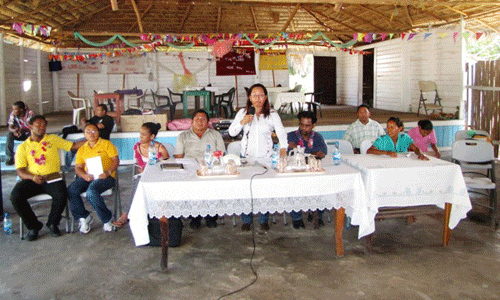–underscores importance of accountability and transparency
The principles of accountability, transparency and good governance were the centre of discussion between Minister of Amerindian Affairs Pauline Sukhai and her team of officials from the ministry and residents of Orealla, a riverine community in Region 6.  Discussions with residents and the village council also centred on the continued upward mobility of the village, following preparations for the upcoming village elections, which will be held on April 23. Addressing the residents and members of the village council of Orealla and and the adjoining community Siparuta, at the Orealla meeting hall, Minister Sukhai said that the decision-making process of the PPP/C government is done through a process of consultations, involving inputs from citizens, youth and seniors, and as such, the same process should be applied at the village level. “ It is very important for the residents of any village, young or old, to always participate in the decision-making and village activities, since togetherness will always breed success,” Minister Sukhai urged residents.
Discussions with residents and the village council also centred on the continued upward mobility of the village, following preparations for the upcoming village elections, which will be held on April 23. Addressing the residents and members of the village council of Orealla and and the adjoining community Siparuta, at the Orealla meeting hall, Minister Sukhai said that the decision-making process of the PPP/C government is done through a process of consultations, involving inputs from citizens, youth and seniors, and as such, the same process should be applied at the village level. “ It is very important for the residents of any village, young or old, to always participate in the decision-making and village activities, since togetherness will always breed success,” Minister Sukhai urged residents.
Amerindian communities across the country are becoming financially independent as government continues to implement policies and programmes that are transforming their village economies and sustaining their traditional ways of life and surroundings.
In this regard, she said that residents and members of the village council should always refer to the Amerindian Act which is a critical tool for the governance, accountability and transparency of their village economy.
Amerindian communities, she said, are becoming more self-sufficient and economically advanced, and as such, the village council should and must always be accountable to their people.
“The issue of village accountability is not a new one…I have been working in the field of Amerindian affairs for many years, and I must say that Amerindian communities have come a far way when it comes to being accountable,” Minister Sukhai said.
This achievement, she said, was not easy, “it was achieved because of the pressures that were placed on the village management by its people,” Minister Sukhai said.
The changing landscape of Amerindian communities, Minister Sukhai said, is testimony to the prudent management of the economy by the PPP/C administration and its people-centred approach, and such should be applied at the village level.
“The residents of this village should always have meaningful engagement with the council, because the management of the village economy is for the betterment of residents…so the community has the right to know the financial position of the village; but at the same time, they should not abuse their rights,” Minister Sukhai urged.
While informing residents about the provision in the Amerindian Act which caters for the elections of new Toshaos and village councils every three years,she urged residents to continue working for the betterment of the community, regardless of who are elected to manage the villages’ affairs.
She urged residents to resolve their differences for the benefit of the community and more so, the country.
The Amerindian Act specifies clearly who can run for office as Toshao or member of the village council.
The Act states that a person may not stand for election or be elected as a Councillor unless he is an Amerindian of at least 18 years of age, is a resident in the village on the date of the nomination; has been continuously resident for a period of not less than three years immediately before his nomination. Any absence from the village for education, employment or health care shall be disregarded in determining continuity of residence. And any candidate should not have been convicted of a serious criminal offence involving violence or dishonesty.
Minister Sukhai also used the opportunity to reflect on the transformation of many Amerindian communities across the country, and numerous programmes that they continue to benefit from, including the annual presidential grants; school feeding and uniform programmes; hinterland secure livelihoods programme; community development plans; unserved areas electrification programme; scholarship and hinterland road programmes; land demarcation; midwives’ training and the hinterland teachers’ upgrading programme.
“The remoteness of the communities or settlement patterns is not an excuse for my government, as it has been investing in providing primary and basic social needs to Amerindians across the country,” Minister Sukhai said.
Government will continue to support the transformation of village economies, but residents also need to be integrally involved in the process and the relaxed attitude from some residents is affecting the rate of development, she said.
“The village has great income-generating capabilities and you,(residents) should work with the council, and at the same time, exploit your indigenous knowledge and practices to promote your community to further expand your income-generating activities,” Minister Sukhai said.
Prior to the meeting, the minister and her team toured the village where they interacted with residents.
The main economic activities of the village are logging, agriculture, sand-mining and small-scale farming. The village comprises Arawaks, Waraus and Caribs.



.jpg)








